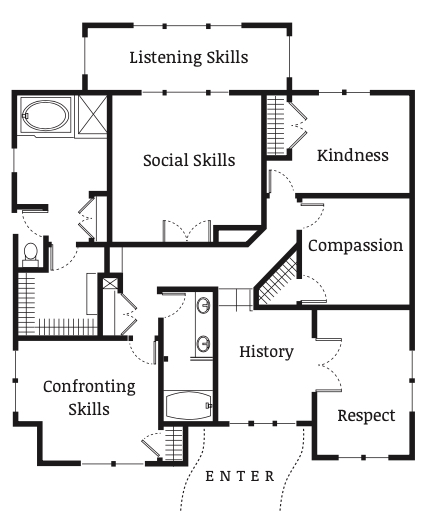How can we improve our communities by accepting our differences with respect? It starts within the walls of our own home.
How do I listen to my spouse with respect and understand that we are not the same?
How can our differences compliment each other?
How can I show respect even when I do not agree?
How does respect translate to our children as we set out to model, to train, and to grow as individuals?
When our children are young and tiny, we start off by teaching respect with please and thank you. It then graduates to something like this,
“You can say ‘no’ to Mommy, but use a polite voice.“
While we cannot guarantee a respectful feeling, as a parent of young children, we can insist on respectful behaviors from our children. See the subtle difference? Little Caleb might not be happy going to bed at 8 PM, but you can expect that he will behave respectfully.
For our teens, we transition to more listening. Respectful listening goes both ways. Communication can start with a feedback (summarization) of what they are voicing:
“I hear you saying that you are really frustrated at Coach for yelling at you today.“
This helps our children feel heard and understood. Isn’t that what we all crave – to be heard? Feedback also allows for adjustments when there are misunderstandings. We might not come to immediate solutions, but we can lay a groundwork for communication and respect. Recognize that the goal in feedback and listening is mutual understanding, not necessarily agreement. We are more likely to come to agreement, as well, when we have done the work of listening and given feedback.
Showing respect affects much of the teaching and learning process. This includes respecting the past (our history), present (our current challenges), and future (our hope). While we do not have to agree with everything, if we do not show respect, we impact the future.
THE FOUNDATION
Wise people are builders: they build families, businesses, communities. And through intelligence and insight their enterprises are established and endure. Because of their skilled leadership, the hearts of people are filled with the treasures of wisdom and the pleasures of spiritual wealth.
Proverbs 24:3-4 [The Passion Translation]
Let each of you look not only to his own interests, but also to the interests of others.
Philippians 2:4 [ESV]
In regards to respect, our homes would look so different, if we were a little more others-focused:
I think I will pick up my dishes so Mom doesn’t do it. I think that would really help her out.
If I return the car tonight with a full tank of gas, Dad won’t have to rush to the gas station in the morning before his early meeting.
Kyle did not make the all-star team this year. He might appreciate a surprise trip to Starbucks before we head out to practice.
Julie had 3 exams and a paper this morning, I bet she will want to come home and take a nap after pulling the all-nighter. I will remind her about the laundry after dinner.
There is always a minimum of two people in a relationship. Two sets of needs; two sets of wants. Why are we surprised that we have conflict? We need to prepare our children to be respectable and respectful.
THE PLAN
In our blueprint (above) of nurturing respect in our homes, Marv and I included seven “rooms” that we felt were important in creating a solid home. Respecting history (those who came before you) and authority (those who are over you) is about acknowledging the past and those in leadership. We may not agree with everything, but we can do the emotional work for healing (in the present) that can change our future. Respect is also embodying compassion and kindness. We can learn to empathize and walk with others in their pain and anger. We can also learn to respond with kindness; this is where listening to others can be the most impactful tool as listening is a function of the heart. Lastly, social skills and confronting skills help us interact better with one another as we live life together.
HOME IMPROVEMENT GUIDE
What does accepting differences look like in our home? Learn from the past . . . Live in the present . . . Build for the future!
Learn From The Past
Our homes, our lives, and our history are far from perfect, but we can learn from it. When we look at the past through the lens of the present, acknowledge the wrongs and choose to forgive. We cannot change the past, but we also cannot fix it if we do not look at it.
What happened in the past was wrong, but from now on, I can do it differently.
When we choose to forgive the past, we choose not to live in resentment and bitterness. Take the time to listen to other people’s accounts of their past, and be grateful for the blessings that you have received from it.
Live In The Present
We are all a work-in-progress. Think about the changes that you can activate in yourself, then your marriage and family. We make a better impact when we are first transformed internally. That personal transformation flows out and affects our relationships with others. Model working on your character while building up the character in your children as you speak into their lives. Become an active listener who is slow to speak and slow to anger [James 1:19] and a compassionate listener who is sensitive to the hurts of those around you. Empower your children to have the courage to speak up for what is right and just. Others may not agree with you, but also, do not feel like you have to agree with every opinion shared, either. We can be respectful and agreeable, even if we do not agree!
Build For The Future
As we look to teach respect to our children, start with truth and principles. What is right? What is wrong? Then, think about your long-term responses rather than your short-term reactions. Remember, we are raising adults. Right now they might be preschoolers or teenagers, but our long-term vision is to teach them to be respectful adults.
HOME DECORATING TIPS
Building a relationship with each child is foundational in creating a sense of belonging – feeling seen, valued, heard. Such relationships require nurturing, and from that stems the opportunity to teach respect and speak into their lives. Here are some practical tips that help us accept differences with respect:
- Teach your child to show respect for those in authority
- Expect your children to obey your commands
- Model and mentor listening to others and to their views
- Give your child opportunities to show compassion and kindness
- Teach social skills
- Raise children with courage to speak out for truth
Many parents ask us about teaching manners. Manners are essentially learning self-control out of respect for others. Why do we need them? Well, our children our special to us, but not necessarily to everyone else!
Manners show consideration for others and allow you to enjoy your children. Others will also find your children more pleasant to have around. (Just recall that last birthday party or sleepover and think about who you are hesitant to invite back again!). Manners will equip your child to know how to handle themselves in various social settings.
At the end of the day, our hope is that we can all sit together, with different backgrounds, opinions, and preferences, and treat each other with respect. Let us listen to each other without judgement while not compromising our values. Our children are learning right in front of us, whether we are intentionally teaching or not. The challenges they face are not uncommon to their peers, and our parenting challenges resonate with those of our neighbors. We are all on a learning journey together.


